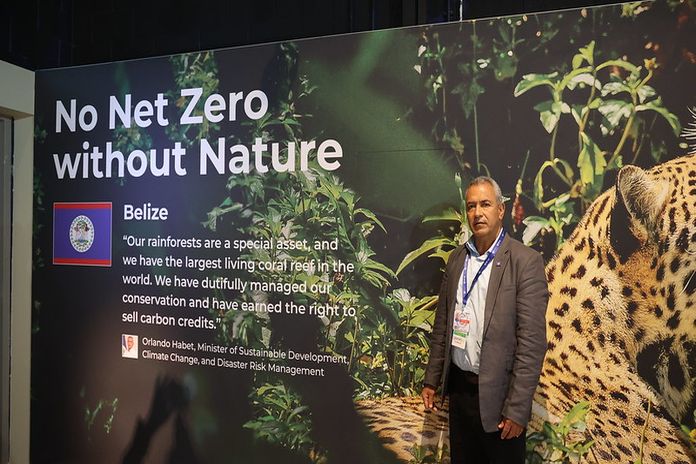Belize advanced key negotiations at COP28

By Government of Belize
BELMOPAN, Belize – The 28th Conference of Parties (COP28) of the United Nations Framework Convention on Climate Change officially closed on December 13, 2023. During the negotiations at COP28, the Belize delegation actively contributed to crucial discussions on global climate change mitigation and adaptation actions. Led by Orlando Habet, minister of sustainable development, climate change and disaster risk management, and Dr Kenrick Williams, CEO in the ministry, the delegation and its lead negotiators, ambassadors Carlos Fuller and Dr Janine Felson, were instrumental in advancing key negotiations and forging collaborative partnerships at the global climate summit.
General progress in the negotiations:
Global Stocktake: COP28 adopted the first Global Stocktake under the Paris Agreement, with parties agreeing to transition away from fossil fuels.
Climate Finance: The Alliance of Small Island Developing States (AOSIS) called for a New Collective Quantified Goal on Climate Finance (NCQG). The NCQG is positioned to succeed the current US$100 billion a year pledge. The outcomes of these deliberations will play a pivotal role in shaping the future trajectory of global climate finance commitments. Minister Habet served as ministerial lead, and ambassador Janine Felson served as lead negotiator on behalf of AOSIS.
Establishment of the Loss and Damage Fund: Starting on a high note, the Loss and Damage Fund received unanimous approval during the opening of COP28. Parties have pledged over US$700 million. The World Bank has assumed the role of interim trustee while hosting the fund’s secretariat.
Global Goal on Adaptation (GGA): The GGA framework is being developed to unify countries to drive political action and enhance adaptation financing. The GGA should guide and strengthen efforts on adaptation, including enhancing adaptive capacity and resiliency.
Market and Non-market Mechanisms (Article 6, Paris Agreement): Limited progress was made on the rules, modalities, and procedures for the implementation of Article 6 mechanisms, which are critical for Belize’s carbon market. Negotiations will continue during subsidiary bodies 60 to achieve transparency, accountability, and integrity of the mechanisms.
Mitigation Work Program: AOSIS, working with other parties, was able to secure key priorities, which should put the world on a path to achieving the temperature goal of the Paris Agreement. These priorities include the tripling of renewable energy capacity, the doubling of energy efficiency by 2030, the phase-down of coal power, a just transition away from fossil fuels in energy systems, and the phasing out of inefficient fossil fuel subsidies. Ambassador Fuller co-facilitated the negotiation, while Mr. Colin Mattis was AOSIS’ chief negotiator.
Technology: Progress was made whereby the joint annual report of the Technology Executive Committee (TEC) and the Climate Technology Centre and Network (CTCN) and the joint work programme (2023-2027) of the TEC and CTCN were accepted.
Overview of Belize’s side events
Habet and CEO Williams participated in 21 side events, including an official COP28 side event co-organized between Belize and the Republic of China (Taiwan) on Cross-level Governance and solutions for Global Net-Zero Transition.
Other prominent features included the SIDS Coalition for Nature and People Mangrove Breakthrough and a dialogue on the United Kingdom’s 10-Point Plan for Financing Nature.
Kennedy Carrillo, CEO in ministry of the blue economy and civil aviation; Jose Urbina, CEO in the ministry of public utilities, energy, logistics and e-governance; and Belize’s technical leads also engaged in side events on agriculture, blue economy, and energy. This included signing onto the Declaration on Resilient Food Systems, Sustainable Agriculture and Climate Action and engaging with the Beyond Oil and Gas Alliance.
The delegation engaged in a series of bilateral meetings fostering collaborations with key nations and organizations. These included Cuba, Taiwan, the United Arab Emirates, the PEW Charitable Trust, the Commonwealth Secretariat, and Central American Commission for Environment and Development, among others.
On December 9, minister Habet delivered the national address on behalf of Belize. He noted that despite its annual impacts from climate change and the effects on its economy, Belize continues to ramp up ambition and implementation of its national mitigation and adaptation actions.
Minister Habet called out the biggest emitters and contributors to climate change, emphasizing that “It is time for transformative action, impactful leadership, and climate justice.”
Belize supports the national and international climate agenda:
- Belize secured a seat on the Adaptation Fund Board, representing Latin America and the Caribbean for the 2024–2025 term. This reflects the nation’s active involvement in shaping global adaptation strategies and ensuring a seat at the table in directing needed climate finance to SIDS like Belize. CEO Williams will serve as director on the Adaptation Fund Board.
- Additionally, Belize will have seats on the Santiago Network for Loss and Damage Advisory Board and the Loss and Damage Fund Board for the 2025 term, further solidifying its position as a proactive force in addressing climate-related challenges.
- Belize will serve as a founding member of the Commonwealth GENIUS (Geospatial Expert for United Solutions) program in partnership with the Commonwealth Secretariat. The initiative aims to utilize geospatial data supporting the management of natural resources, including supporting carbon stock assessments and overall climate-resilient development.
- Belize will now have access to the toolkit for Climate Finance Advisors. This marks a significant step in empowering Belize to navigate and access climate finance effectively, as more than 200 Belizeans will have the opportunity to be trained and certified in climate finance.
The ministry of sustainable development, climate change and disaster risk management congratulates the excellent team of negotiators who worked tirelessly to defend Belize, CARICOM, and AOSIS positions during the COP.
Despite its disappointment in the very limited progress at COP28, Belize remains committed to the global process of advancing climate action. Belize will continue to champion the special circumstances of SIDS, the need for climate finance to support building climate resiliency, and for real global mitigation actions, including the transition from fossil fuels and an increase in the share of renewables.
Source: caribbeannewsglobal.com


